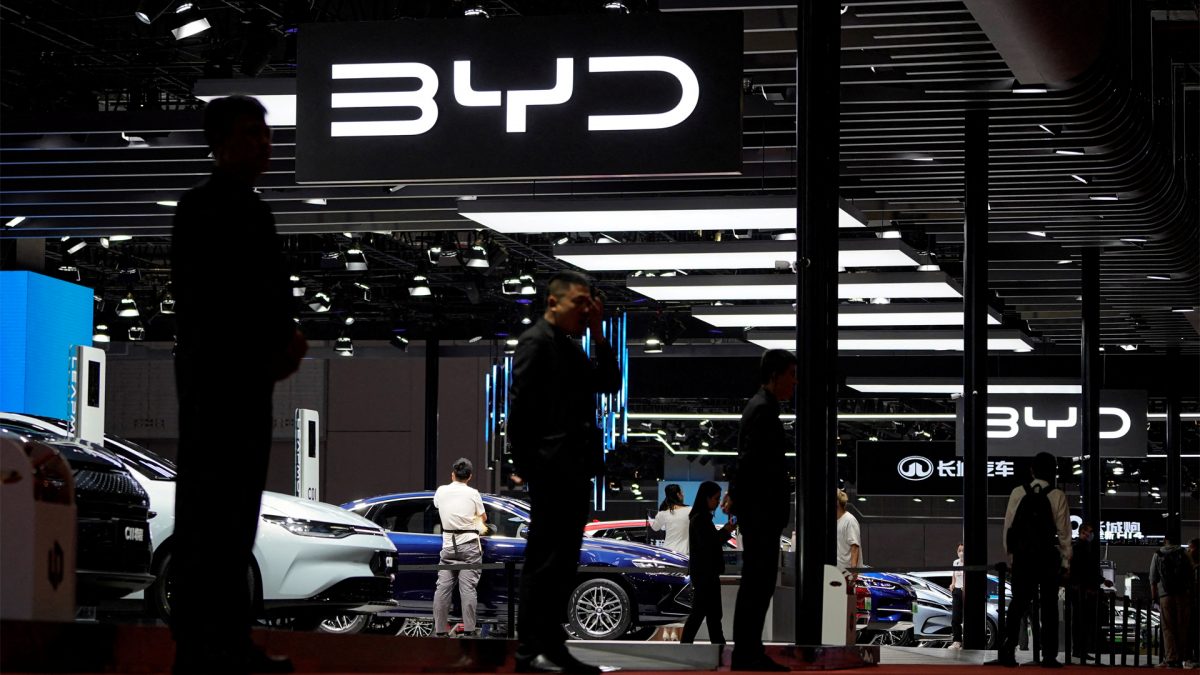BYD’s rapid ascent in the automotive rankings is particularly notable as many leading global automakers, including industry giants like Toyota Motor and Volkswagen Group, experienced declines in the same period read more
)
In a significant shift within the global automotive landscape, China’s BYD has risen to become the seventh-largest automaker worldwide by the number of vehicles sold during the April-June quarter, according to data from automakers and research company MarkLines.
This remarkable leap was driven by a 40 per cent year-on-year increase in sales, totalling 980,000 units, propelled largely by the growing demand for BYD’s affordable electric vehicles (EVs).
BYD’s rapid ascent in the automotive rankings is particularly notable as many leading global automakers, including industry giants like Toyota Motor and Volkswagen Group, experienced declines in the same period. A substantial portion of BYD’s growth can be attributed to its burgeoning overseas market, where sales nearly tripled compared to the previous year, reaching 105,000 units.
In the same quarter of the previous year, BYD had ranked 10th globally, with 700,000 vehicles sold. However, the company has since surpassed Japanese automakers Nissan and Suzuki, and for the first time, outpaced Honda on a quarterly basis. Toyota remains the only Japanese automaker ahead of BYD, having led global sales in the April-June period with 2.63 million vehicles. Despite this, BYD is rapidly closing the gap with major U.S. automakers, particularly Ford Motor.
BYD’s success is part of a broader trend in which Chinese automakers are gaining ground on the global stage. Companies like Geely and Chery Automobile also ranked within the top 20 in global sales for the April-June period.
The surge in BYD’s sales, especially in China—the world’s largest auto market—has been fueled by the growing popularity of its electric vehicles, leading to a 35 per cent year-on-year increase in sales for June alone.
In contrast, Japanese automakers, whose strengths have traditionally been in gasoline-powered vehicles, are facing significant challenges.
Honda, for instance, saw its sales in China drop by 40 per cent in June and has announced plans to reduce its production capacity in the country by approximately 30 per cent. Even in Thailand, where Japanese brands dominate with around 80 per cent market share, companies like Suzuki are ending production, while Honda is halving its capacity.
China’s dominance in vehicle exports has also become evident, with the country exporting 2.79 million vehicles in the first half of 2024, surpassing Japan by 780,000 units. BYD, in particular, is expanding its global footprint by opening its first full-scale overseas vehicle assembly plant in Thailand and planning additional hubs in Hungary and Brazil, with Mexico also under consideration for future production.
These moves are part of BYD’s strategy to mitigate the impact of rising tariffs on Chinese-made EVs in various markets, including the U.S., where tariffs have been increased to 100 per cent, and Canada, which is contemplating similar measures.
The European Union has also begun imposing additional tariffs on Chinese-made EVs, with potential increases up to 36.3 per cent, prompting BYD to plan a new factory in Turkey to avoid these tariffs.
Elon Musk too has a reason to be worried. Musk was adamant about dominating the global EV scene. However, Chinese EV companies have proven to be a major hindrance for Tesla. BYD in particular has been a major threat to Tesla especially in the European and Chinese markets.
For Japanese automakers struggling to keep pace with Chinese competitors, the North American market, where Chinese EVs have little presence due to high tariffs, is becoming increasingly vital. While EV demand in North America has slowed, hybrids from Toyota and Honda are seeing popularity.
However, it remains uncertain whether this success in North America will be enough to offset declining sales in China and other regions.
As competition intensifies, the need for scale to reduce costs and develop new, profitable models is more crucial than ever.
In response, Honda is collaborating with Nissan and Mitsubishi Motors on electric vehicle development, signaling that broader industry consolidation may be on the horizon as automakers strive to stay competitive against the rising tide of Chinese automotive prowess.

 3 weeks ago
5
3 weeks ago
5
)
)
)
)
)
)
)
)
)
)
)
)
)
)
)
)
)
)
)
)
)
)
)
)
 English (US) ·
English (US) ·